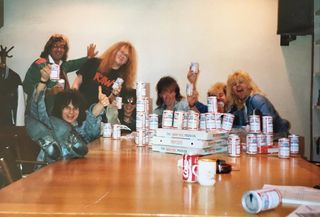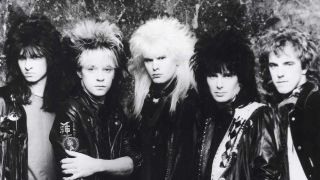There are no prizes for knowing what Shy, Terraplane, Tobruk, Strangeways, Heavy Pettin’, Airrace, Lionheart, Kooga and Grand Prix all have in common.
Yes, the answer is that all were popular British-based melodic hard rock acts from the mid-to-late 1980s. The decade, crowned by the success of Def Leppard, Bon Jovi and Europe, was the golden era of AOR, and for a while every record company craved its own poodle-haired, tight-trousered cash cows. Shy made albums for three major labels, and for a while the band seemed in with a genuine shot at the big time, but it ended up as a pipedream.
Before adopting the name Shy, the band’s roots lay in the altogether heavier, twin-guitar metal of Trojan. But even in 1982 they sensed the wind of change, and set out to leave pub-metal behind, emphasising the contribution of classically trained keyboardist Paddy McKenna.
Coincidentally, on the same day that guitarist Steve Harris (no relation), bassist Mark Badrick and drummer Alan Kelly received an offer to make an album for Hull-based independent Ebony Records, a helium-voiced ball of energy called Tony Mills was sacked by his own band. Early photos confirm Mills’s penchant for Bowie-esque face paint, although after an “arse-slapping incident” in what transpired to be a Birmingham gay bar the make-up box was slammed shut and binned. In late 1983, Kerrang! hailed the band’s debut album Once Bitten… Twice Shy as ‘perhaps the greatest English pomp rock album of all time’.
However, an interview the band did with the magazine was a testy experience that certainly didn’t endear Shy to the rock press and to other bands.
“Being so raw and naïve, we had no real idea how to handle ourselves in those situations,” Harris explained. “We often got portrayed as arrogant, and a lot of that was down to Tony. Things are very black-and-white with him, and we were always extremely confident, which sometimes got misconstrued.”
Kung fu enthusiast Badrick had an unfortunate habit of breaking fingers and thumbs (his own, that is), so Shy poached Roy Davis from local rivals Trouble just as Shy were signing a deal with RCA Records.
Thinking big, the label brought in Tony Platt, who had worked alongside Mutt Lange on records by AC/DC and Foreigner, to produce Shy’s 1985 album Brave The Storm. Platt worked especially hard on the vocals, bringing in Uriah Heep’s Pete Goalby and John Sinclair to multi-track the choruses.
In hindsight perhaps he went a little too far, although Hold On (To Your Love), Keep The Fires Burning and the big ballad Reflections all helped swell the group’s growing fan base. Having already gigged with UFO, Magnum and Twisted Sister, Shy then landed high-profile supports with Bon Jovi, Meat Loaf and Gary Moore.
For their all-important third album, RCA packed Shy off to Los Angeles to soak up the Californian hard-rock radio vibe and write some songs. It turned out to be a masterstroke. As did bringing in producer Neil Kernon, a red-hot property after major works with Dokken and Queensrÿche. The resulting record, 1987’s Excess All Areas (the group’s only top 75 album in the UK) kicked off with the Michael Bolton/Duane Hitchings-penned Emergency, and also boasted top-quality Shy-written anthems like Can’t Fight The Nights, Telephone, Talk To Me and Break Down The Walls.
According to Mills, Don Dokken’s co-credit on the latter was misleading: “We wrote a song with Don called Last Chance, which Neil Kernon thought was bollocks,” he said. “So all that was kept was the intro riff – which, quite frankly, ripped off Queen’s Hammer To Fall. But Don’s name stayed on the track for the association it could bring us.”
Mention of Dokken elicited weary sighs from the Shy men. “RCA paid him £1,000 for a day’s work with us, but he didn’t turn up till 1pm, and although we were halfway through a song he walked out as the clock ticked to 6.01pm,” Mills said curtly.
Such was the quality of Excess All Areas that (just like FM’s Tough It Out, and Native Sons by Strangeways) it still seems inexplicable why its creators weren’t propelled to major stardom on the back of it.
“In any genre, there will only ever be a couple of winners,” Steve Harris reflected. “But it’s surprising how many people talk of that album in hushed tones and don’t actually own a copy – or only bought the reissue.”
“Europe’s The Final Countdown was all over the radio when we were in Holland [where Excess All Areas was recorded]” Davis remembered. “It was an exciting time because everyone kept saying: ‘Shy are next’. But we waited and waited and ‘next’ never happened.”
Part of the problem was that egotism still sullied Shy’s reputation. While acknowledging that too much booze was sometimes consumed, the band still insist that their caustic sense of humour was misinterpreted. And while British rock fans will stomach brashness from American stars, they’re less prepared to accept it from someone who lives just off the M6.
“It got so out of control that people apparently used to come to shows to listen out for things that Tony might say to the audience,” Harris said. “I felt sorry for the guy, especially as I personally have never thought of him as excessively arrogant.”
Another thing Shy were criticised for was using sampled backing vocals in their live shows. In that respect they were far from alone, but Davis mused: “I never understood why we got slaughtered for it and nobody else did.”
Perhaps Mills had the answer: “Once during a gig at the Marquee, some guy in the audience threw a biscuit at Paddy,” the vocalist smiled. “As we played Devil Woman, this biscuit bounced off Paddy’s nose, hit the keyboard that triggered the samples, and the disc skipped: ‘She’s just a… Break down the walls…’. It was absolutely superb! But everyone in the band can sing now.”
Behind the scenes there was also intense friction between Mills and Alan Kelly, and, as Harris reluctantly admitted, the group often chose to back Kelly. It eventually lead to the singer’s departure. “As the band’s other strong character, Alan almost became our spokesman,” Harris explained. “What made things even worse was that, after Tony moved away from Birmingham, Alan sometimes wrote lyrics. Although Alan contributed to some major Shy songs, Tony found it very hard to sing things by the drummer – the band member he had the least respect for."
After Shy were dropped by RCA, their new label MCA sent them back to California to work with Roy Thomas Baker (whose illustrious résumé includes Queen, Foreigner and Ozzy Osbourne) on the next album, Misspent Youth. But the enthusiasm of both parties vanished in a puff of smoke during a fierce row during pre-production.
Mills: “We’d worked up arrangements and already played some of the songs live. But after Roy heard Burning Up he told us: ‘I’d like to alter the introduction.’ Alan Kelly stood up behind the kit and announced: ‘You’re not changing any of my songs, you fat cunt.’ So Roy went: ‘See you in a fortnight’, got in his Rolls and went home.”

The band insist that because of this schism, Thomas Baker hired and fired five engineers to take the strain during a thoroughly half-hearted session. Shy were so horrified by the master tapes that they tried to remix them.
“Misspent Youth sounds like a complete bag of shite,” Davis huffed. “And we then had to enthuse about it to British journalists that already hated us. It was awful, because we knew that they knew that we knew.”
After Shy’s British tours with the Hunter Ronson Band and US shows with Badlands, Enuff Z’Nuff and the Sleeze Beez, Mills heard nothing from his bandmates for around three months, and was eventually presented with demos for the next album as a fait accompli. “I told them: ‘I’m not singing on that stuff.’ Because what they’d written was crap,” he muttered.
They told him he was out. With his new group, Siam, Mills opted for darker, more Queensrÿche-like territory. Shy hooked up briefly with former XS/After Hours singer John Francis. As evidenced by What Love Can Make You Do, a track unearthed for the 2005 Sanctuary Records collection Reflections • The Anthology 1983-2005, the results were rather exceptional; but the relationship was doomed. Rumours were that he had an indiscretion with a band member’s wife – but the band refused to comment.
“We actually waited 12 months for John Francis because he was tied up contractually,” Davis winced. “But after joining he did something I’d rather not go into. The demos were great, but we had to sling the guy out."
John Ward was a former Trojan frontman who’d moved to America to join Madam X prior to the arrival in that band of Sebastian Bach. Relocating back to Brum was an unlikely career move for Ward, but he did so to record Shy’s Welcome To The Madhouse album, released in 1994. Its boisterousness was incongruous among all the flannel-shirts and misery, but Kerrang! closed a rave review of the album with the declaration: ‘Shy are supposed to be shite, remember?’
“I’d come to believe the press hostility had a lot to do with Tony,” Harris said of the Shy’s disintegration. “But even after he left, the stigma wouldn’t go away. I didn’t think the band would ever work together again, especially with Tony.”
The catalyst for Shy’s reunion with Mills was a series of releases of out-takes and live material issued by Neat Records in 1999 (one of which, Regeneration, the group briefly attempted to push as a brand new record). Mills eventually agreed to come on board if Alan Kelly was axed, causing the drummer to claim he’d been “stabbed in the back for a few measly pounds”.
“I had to hold the phone away from my ear for a bit when Alan got hold of me,” Harris confided. “But, to be fair, he’d not picked up a drumstick since 1995.”
Shy released two more studio albums with Mills – Unfinished Business in 2002 and Sunset And Vine in 2005 – but a year later he departed to join Norwegian rockers TNT. His replacement was former Surveillance and Phenomena singer Lee Small, with whom they recorded the self-titled Shy in 2011, but a month after the album's release in September of that year, Harris died of a brain tumour.
The band continued. A tribute show to Harris took place at The Asylum in Birmingham the following year, and things came full circle when Tony Mills returned to Shy in 2014 for their performance at Firefest, the annual melodic rock festival held at Rock City in Nottingham.
Five years later, Tony Mills himself was gone, dead at 57, just months after being diagnosed with terminal pancreatic cancer in April 2019.
"We have no words," wrote the band. "Rest in peace Tony. Thank you for everything."
The original version of this feature appeared in Classic Rock 90, in March 2006.





